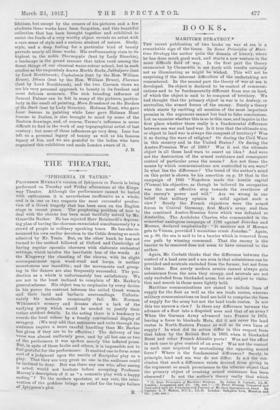THE THEATRE.
"IPHIGENIA IN TAURIS."
PROFESSOR MURRAY'S version of Iphigenia in Patois is being performed ou Tuesday and Friday afternoons at the Kings- way Theatre. Although the performance cannot be hailed with enthusiasm it is nevertheless inoffensive as a whole, and is in one or two respects the most auccessful produc- tion of a Greek tragedy that has been seen on the English stage in recent years. The perplexing problem of how to deal with the chorus has been most tactfully solved by Mr. Granville Barker. He has rejected Herr Reinhardt's depress- ing plan of having the choruses enunciated simultaneously by a crowd of people in ordinary speaking tones. He has also re- nounced his own earlier devotion to the Celtic droning so much admired by Mr. Yeats. But, on the other hand, he has not turned to the method followed at Oxford and Cambridge of baying regular operatic choruses with elaborate orchestral settings, which involve the inevitable loss of the words. At the Kingeway the chanting of the chorus, with its slight accompaniment upon wood-wind and harps, is neither monotonous nor inaudible ; and the movements and group- ing in the dances are also frequently successful. The pro- duction as a whole is unfortunately less satisfactory. We are not in the least inclined to complain of Mr. Barker's general scheme. His object was to emphasize by every device in his power the contrast between the exiled Greek women and their lurid and barbaric surroundings. Unfortu- nately his methods occasionally fail. Mr. Norman Wilkinson's scenery and dresses show a lack of the 'Unifying grasp which would be needed to justify their rather strident details. In the acting there is a tendency to overdo the local colour by a fussily conventional display of savagery. (We may add that entrances and exits through the audience require a more careful handling than Mr. Barker has given if they are to be effective.) The delivery of the verse was almost uniformly poor, and by all but one or two of the performers it was spoken merely • like inflated prose. But, in spite of these faults and others, it is impossible not to feel grateful for the performance. It enabled one to form some sort of a judgment upon the merits of Euripides' play as a Play. That they are very great no one in the audience could be inclined to deny. But was there any one who, after seeing it acted, would not hesitate before accepting Professor Murray's description of it as "a romantic play with a happy ending" P To the modern spectator, at any rate, the inter- vention of the goddess brings no relief for the tragic failure of 1phieenia's plot.
B.






































 Previous page
Previous page